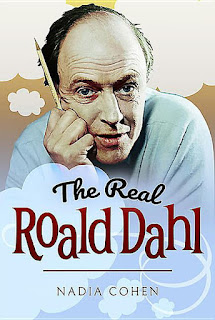The author of so many popular children's books lived an R-rated life. As a young man he attracted older women, most of them married and famous. Cohen tells how he once attended a movie premiere with actress Nancy Carroll and left with Congresswoman Clare Booth Luce, both women married and much older. Later he left his wife for a younger woman.
Although one of the most kind and generous of men, he also loved an argument and could be insufferably rude, even to guests at his own parties.
Although a literary man with no medical training, his pioneering efforts led to the invention of the Dahl-Wade-Till Valve used to save the lives of nearly 3,000 children around the world. This work was inspired by the brain damage suffered by his son, Theo.
Brain damage became a strange and tragic family curse. He had suffered head injuries as a pilot in World War II. His wife, actress Patricia Neal, had a brain-damaging stroke. His daughter Olivia died from a brain injury. Another daughter had a brain tumor.
Through it all Dahl wrote James and the Giant Peach, Fantastic Mr. Fox, Matilda, Charlie and the Chocolate Factory and other gems that children have loved for generations.












